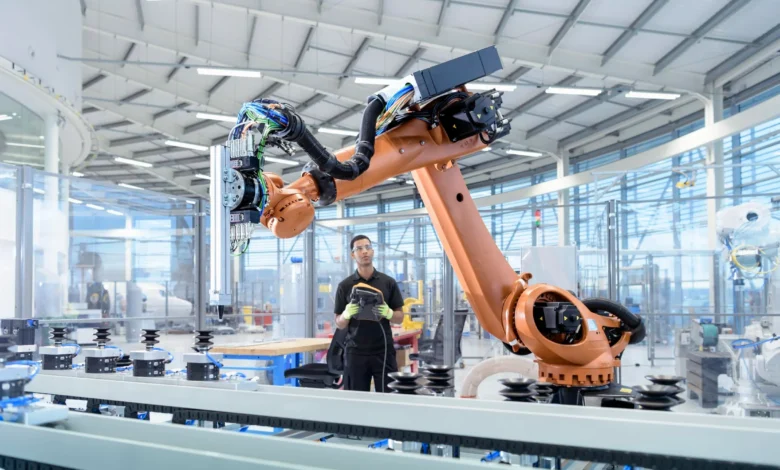
The field of robotics engineering has emerged as one of the most exciting and rapidly growing career paths in the modern technological landscape. As industries worldwide embrace automation and artificial intelligence, the demand for skilled robotics engineers continues to soar, creating unprecedented opportunities for aspiring professionals. From manufacturing floors to healthcare facilities, from space exploration to autonomous vehicles, robotics is revolutionizing how we live and work.
Starting a career in robotics engineering requires a unique blend of interdisciplinary knowledge, technical expertise, and creative problem-solving abilities. Unlike traditional engineering disciplines, robotics engineering careers demand proficiency across multiple domains, including mechanical engineering, electrical engineering, computer science, and artificial intelligence. This multifaceted nature makes robotics both challenging and incredibly rewarding for those willing to invest in continuous learning and skill development.
The journey to becoming a robotics engineer may seem daunting at first, with numerous pathways, educational requirements, and specializations to consider. However, with proper guidance and a structured approach, anyone with passion and dedication can successfully navigate this career path. Whether you’re a high school student exploring future options, a college graduate seeking direction, or a professional considering a career transition, the opportunities in robotics are vast and accessible.
This comprehensive guide will walk you through everything you need to know about launching your robotics engineering career. We’ll explore the fundamental skills required, educational pathways available, practical experience opportunities, and strategies for landing your first robotics job. You’ll discover the various specializations within robotics, understand industry trends, and learn how to position yourself for success in this dynamic field. By the end of this article, you’ll have a clear roadmap to transform your interest in robotics into a thriving professional career that shapes the future of technology.
Robotics Engineering as a Career
Robotics engineering represents the convergence of multiple engineering disciplines focused on designing, building, and programming intelligent machines. As a robotics engineer, you’ll work on creating systems that can perceive their environment, make decisions, and perform tasks autonomously or semi-autonomously. This field encompasses everything from industrial robotic arms and autonomous vehicles to humanoid robots and medical surgical systems.
The scope of robotics engineering careers extends far beyond traditional manufacturing. Modern robotics professionals work in diverse sectors, including healthcare robotics, agricultural automation, space exploration, defense systems, consumer electronics, and entertainment. Each sector presents unique challenges and opportunities, requiring engineers to adapt their skills to specific industry requirements while maintaining core robotics competencies.
What makes a career in robotics particularly appealing is its direct impact on solving real-world problems. Robotics engineers contribute to developing technologies that enhance human capabilities, improve safety in hazardous environments, increase efficiency in production, and even save lives through medical applications. The satisfaction of seeing your creations perform complex tasks and make tangible differences in people’s lives is unmatched in most other engineering fields.
The robotics industry is experiencing exponential growth, with market analysts projecting continued expansion through the next decade. This growth translates to robust job security, competitive salaries, and abundant opportunities for career advancement. Entry-level robotics engineers can expect strong compensation packages, while experienced professionals often command premium salaries, especially in specialized fields like autonomous systems or artificial intelligence integration.
Essential Skills Required for Robotics Engineers
Succeeding in robotics engineering requires mastering a diverse skill set that spans both technical and soft skills. The technical foundation includes strong capabilities in programming languages such as Python, C++, and MATLAB, which are essential for controlling robotic systems and implementing algorithms. Python has become particularly popular due to its extensive libraries for machine learning and computer vision, while C++ remains crucial for real-time control systems requiring optimal performance.
Mechanical engineering knowledge forms another critical pillar of robotics expertise. Kinematics, dynamics, mechanics of materials, and thermodynamics enable you to design robust physical structures for robots. You’ll need to grasp concepts like degrees of freedom, torque calculations, gear ratios, and structural integrity to create machines that can withstand operational stresses while performing their intended functions efficiently.
Electrical engineering and electronics proficiency are equally important for any aspiring robotics engineer. This includes circuit design, microcontrollers, sensors, actuators, and power systems. Knowledge of embedded systems programming allows you to interface with hardware components and create the electrical infrastructure that brings mechanical designs to life. Familiarity with platforms like Arduino and Raspberry Pi provides practical starting points for developing these skills.
Computer vision and machine learning have become indispensable skills in modern robotics. Robots need to perceive and interpret their environment, which requires implementing algorithms for image processing, object recognition, and sensor fusion. Neural networks, reinforcement learning, and other AI techniques enable you to create intelligent systems that can learn from experience and adapt to changing conditions.
Beyond technical abilities, successful robotics engineering careers demand strong problem-solving skills, creativity, and the ability to think systematically. Robotics projects often encounter unexpected challenges requiring innovative solutions. Collaboration and communication skills are equally vital, as robotics engineers typically work in multidisciplinary teams, requiring clear articulation of complex technical concepts to diverse stakeholders.
Educational Pathways to Become a Robotics Engineer

The traditional route to a robotics engineering career begins with obtaining a bachelor’s degree in robotics engineering, mechanical engineering, electrical engineering, or computer science. Many universities now offer dedicated robotics engineering programs that provide comprehensive interdisciplinary training. However, if your institution doesn’t offer a specific robotics degree, majoring in mechanical or electrical engineering with a focus on robotics coursework and projects can be equally effective.
During your undergraduate education, prioritize courses in calculus, linear algebra, differential equations, physics, statics and dynamics, control systems, and programming. These foundational subjects form the mathematical and theoretical basis for complex robotics concepts. Additionally, seek out electives in artificial intelligence, computer vision, sensor technologies, and autonomous systems to broaden your robotics-specific knowledge.
Many aspiring robotics engineers pursue graduate education to gain advanced expertise and research experience. A master’s degree in robotics or a related field can significantly enhance your career prospects, especially for positions involving research and development or specialized technical roles. Graduate programs often provide opportunities to work on cutting-edge projects, publish research papers, and build professional networks that prove invaluable for career advancement.
Doctoral programs are ideal for those interested in academic careers, fundamental research, or leadership positions in research-intensive organizations. However, practical robotics engineering careers don’t always require advanced degrees. Many successful robotics professionals have built thriving careers with bachelor’s degrees supplemented by continuous learning, certifications, and hands-on project experience.
Alternative educational pathways include bootcamps, online courses, and vocational training programs focused on specific robotics technologies. Platforms like Coursera, edX, and Udacity offer specialized robotics courses and nanodegrees created by leading institutions and companies. These can be particularly valuable for career changers or professionals seeking to add robotics skills to their existing expertise. Self-directed learning through open-source projects and online communities also plays a crucial role in developing practical robotics capabilities.
Building Practical Experience in Robotics
Theoretical knowledge alone won’t suffice for a successful career in robotics engineering. Employers highly value practical experience demonstrating your ability to apply concepts to real-world challenges. Start building hands-on experience as early as possible through personal projects, even if they’re simple at first. Building basic robots using Arduino or Raspberry Pi kits helps you understand the integration of hardware and software while developing troubleshooting skills.
Participating in robotics competitions provides excellent opportunities to apply your skills under real-world constraints. Events like FIRST Robotics, RoboCup, DARPA Robotics Challenge, and various university-level competitions challenge teams to solve complex problems within specific timeframes. These competitions not only enhance technical skills but also develop teamwork, project management, and presentation abilities that employers find attractive.
Internships represent the gold standard for gaining professional experience in robotics engineering. Seek internship opportunities at robotics companies, technology firms with robotics divisions, research laboratories, or manufacturing facilities utilizing automation. Even if the internship isn’t directly robotics-focused, any exposure to automation, control systems, or embedded programming adds value to your resume and helps you understand industry workflows.
Contributing to open-source robotics projects offers another valuable avenue for building experience and visibility within the robotics community. Platforms like GitHub host numerous robotics projects where you can contribute code, documentation, or testing. Working with established projects like ROS (Robot Operating System), OpenCV, or various Arduino libraries helps you learn industry-standard tools while demonstrating your capabilities to potential employers.
Academic research assistantships provide opportunities to work on advanced robotics projects while still in school. Many professors welcome motivated students to join their research groups, offering exposure to cutting-edge technologies and methodologies. These positions often lead to publications, conference presentations, and strong recommendation letters—all valuable assets when seeking employment or graduate school admission.
Choosing Your Robotics Engineering Specialization
The field of robotics engineering encompasses numerous specializations, each requiring unique skill sets and offering distinct career trajectories. Industrial robotics focuses on automation systems for manufacturing, warehousing, and logistics. This specialization involves programming robotic arms, designing automated assembly lines, and optimizing production workflows. Industrial robotics offers stable career opportunities with established companies and consistent demand.
Medical robotics represents one of the fastest-growing specializations, developing surgical robots, rehabilitation devices, prosthetics, and diagnostic systems. This field combines robotics engineering with biomedical knowledge, requiring an of medical procedures, human anatomy, and stringent regulatory requirements. Medical robotics professionals often work in research institutions, medical device companies, or hospitals, developing technologies that directly improve patient outcomes.
Autonomous vehicles and mobile robotics constitute another exciting specialization area. Engineers in this field work on self-driving cars, delivery robots, drones, and unmanned aerial or underwater vehicles. This specialization heavily emphasizes computer vision, sensor fusion, path planning, and machine learning algorithms. Companies ranging from automotive manufacturers to technology giants and startups actively recruit specialists in autonomous systems.
Service robotics involves creating robots for consumer applications, hospitality, retail, and personal assistance. This includes domestic robots, social robots, entertainment robots, and agricultural automation. Service robotics requires strong user experience design skills alongside technical capabilities, as these robots interact directly with non-technical users. The field is rapidly expanding as society becomes more comfortable with robots in everyday environments.
Research and development in robotics engineering offer opportunities to work on fundamental problems and breakthrough technologies. Academic institutions, government research laboratories, and corporate R&D departments employ robotics researchers to explore new materials, control algorithms, AI integration, and novel applications. This specialization typically requires advanced degrees but provides intellectual freedom and the chance to shape the future direction of robotics technology.
Mastering Programming and Software Skills
Proficiency in programming languages stands as a cornerstone skill for any robotics engineer. Python has become the predominant language in robotics due to its readability, extensive libraries, and strong support for machine learning and data processing. Learning Python thoroughly, including libraries like NumPy, SciPy, OpenCV, TensorFlow, and PyTorch, provides the foundation for implementing sophisticated robotics algorithms.
C++ remains essential for performance-critical applications in robotics engineering. Real-time control systems, embedded programming, and resource-constrained environments often require C++’s efficiency and hardware-level access. Object-oriented programming, memory management, and concurrent programming in C++ enable you to develop robust, efficient robotics software that can handle complex real-time operations.
The Robot Operating System (ROS) has become the industry-standard middleware framework for robotics development. ROS provides tools, libraries, and conventions that simplify creating complex robot behaviors. Mastering ROS, including concepts like nodes, topics, services, and the transform system, is virtually mandatory for modern robotics engineering careers. Both ROS1 and ROS2 knowledge is valuable, with ROS2 becoming increasingly important for industrial applications.
Version control systems, particularly Git, are critical for collaborative robotics development. Branching, merging, pull requests, and code review processes enable effective teamwork on complex projects. Familiarity with continuous integration and continuous deployment (CI/CD) pipelines helps maintain code quality and streamline development workflows in professional robotics engineering environments.
Simulation tools like Gazebo, V-REP (CoppeliaSim), and Webots allow robotics engineers to test and validate systems in virtual environments before deploying to physical hardware. Proficiency with these tools accelerates development cycles, reduces hardware damage from errors, and enables testing scenarios that would be dangerous or impractical in the real world. Learning to create accurate simulation models and interpret simulation results is an invaluable skill.
Hardware and Electronics in Robotics
Comprehensive robotics engineering requires a solid of hardware components and electronics systems. Sensors form the sensory inputs for robots, including cameras, LiDAR, ultrasonic sensors, IMUs (Inertial Measurement Units), force/torque sensors, and encoders. Sensor specifications, limitations, and integration methods enable you to select appropriate sensors for specific applications and process their data effectively.
Actuators transform electrical signals into physical motion, serving as the muscles of robotic systems. Common actuators include DC motors, servo motors, stepper motors, linear actuators, and pneumatic/hydraulic systems. A successful robotics engineer understands motor specifications, control methods, gear reduction principles, and how to select actuators based on torque, speed, and precision requirements for different applications.
Microcontrollers and embedded systems provide the computational core for many robotic systems. Popular platforms like Arduino, ESP32, and STM32 microcontrollers offer accessible entry points for learning embedded programming and hardware interfacing. How to read datasheets, interface with peripherals using protocols like I2C, SPI, and UART, and optimize code for resource-constrained environments is essential for robotics engineering careers.
Power systems design ensures robots have adequate, reliable energy supplies. This includes battery technologies (lithium-ion, lithium-polymer, etc.), power regulation circuits, and energy management strategies. For mobile robots, optimizing power consumption directly affects operational duration and practicality. Knowledge of charging systems, power distribution, and electrical safety standards is critical for developing professional robotic systems.
Circuit design and PCB (Printed Circuit Board) layout skills enable robotics engineers to create custom electronics for specific applications. While off-the-shelf components work for prototyping, production robotics often requires custom circuit boards integrating multiple functions. Familiarity with design tools like KiCad, Eagle, or Altium Designer, along with electromagnetic compatibility and signal integrity, allows you to create reliable, manufacturable electronic systems.
Networking and Professional Development in Robotics

Building a strong professional network significantly accelerates your robotics engineering career development. Join professional organizations like the IEEE Robotics and Automation Society, which provide access to technical publications, conferences, and networking opportunities. Student memberships offer affordable entry points to professional communities where you can connect with experienced engineers, learn about industry trends, and discover job opportunities.
Attending robotics conferences and workshops exposes you to cutting-edge research and industry practices. Events like ICRA (International Conference on Robotics and Automation), IROS (International Conference on Intelligent Robots and Systems), and various industry-specific conferences provide opportunities to present your work, learn from experts, and meet potential employers or collaborators. Many conferences offer reduced rates for students and early-career professionals.
Online communities play an increasingly important role in robotics engineering professional development. Platforms like ROS Discourse, Reddit’s robotics communities, Stack Overflow, and specialized Discord servers connect you with robotics professionals worldwide. Actively participating in these communities by asking thoughtful questions, sharing your projects, and helping others builds your reputation and expands your knowledge base.
Creating an online portfolio showcasing your robotics projects establishes your credibility and visibility to potential employers. Develop a professional website or maintain an active GitHub profile documenting your projects with clear descriptions, code, videos, and technical write-ups. Many employers review candidates’ GitHub repositories during hiring processes, making this an effective way to demonstrate your practical capabilities.
Mentorship relationships provide invaluable guidance for navigating robotics engineering careers. Seek mentors through university programs, professional organizations, or networking events. Experienced engineers can offer career advice, technical guidance, and an introduction to opportunities that might not be publicly advertised. Similarly, as you gain experience, mentoring others reinforces your own knowledge and contributes to the robotics community’s growth.
Finding Your First Job in Robotics Engineering
Securing your first position as a robotics engineer requires strategic preparation and persistence. Tailor your resume to highlight relevant skills, projects, and experiences that demonstrate your robotics capabilities. Quantify achievements whenever possible—for example, “Programmed autonomous navigation system achieving 95% obstacle avoidance accuracy” sounds more impressive than “Worked on robot navigation.” Emphasize both technical skills and soft skills like teamwork and communication.
Target your job search toward companies and organizations that align with your interests and specialization. Research companies thoroughly before applying, their products, technologies, and culture. Robotics engineering positions exist in various contexts—technology companies, automotive manufacturers, aerospace firms, medical device companies, startups, research institutions, and defense contractors—each offering different experiences and career trajectories.
Prepare thoroughly for technical interviews in robotics engineering. Expect questions covering fundamental concepts in mechanics, electronics, programming, and control systems. Be ready to solve coding problems, explain past projects in detail, and demonstrate problem-solving approaches. Many companies include practical assessments where you might need to debug code, design a simple robot, or propose solutions to robotics challenges.
Leverage university career services, alumni networks, and professor recommendations when searching for robotics engineering careers. Many positions are filled through referrals and networking rather than public job postings. Inform professors, former supervisors, and industry contacts that you’re seeking opportunities—they may know of openings or can introduce you to hiring managers. Don’t underestimate the power of personal connections in landing your first role.
Consider starting with internships, contract positions, or entry-level technician roles if direct engineering positions prove difficult to secure initially. These positions provide industry experience, professional references, and often lead to permanent engineering roles. Many successful robotics engineers began their careers in supporting roles before advancing to engineering positions. The key is getting your foot in the door and continuously demonstrating your capabilities.
Continuing Education and Career Advancement
The rapidly evolving nature of robotics engineering demands commitment to lifelong learning. Technology advances, new algorithms emerge, and industry requirements shift constantly. Successful robotics engineers dedicate time regularly to learning new tools, programming languages, and methodologies. Online learning platforms, technical books, research papers, and experimentation with new technologies help maintain and expand your skill set throughout your career.
Professional certifications can enhance your credentials and demonstrate expertise in specific technologies. While robotics doesn’t have universal certification standards like some fields, certifications in areas like ROS, specific programming languages, cloud computing, or AI/machine learning add value to your profile. Vendor-specific certifications from companies like FANUC, ABB, or KUKA are particularly valuable for industrial robotics specializations.
Career advancement in robotics engineering can follow technical or management tracks. Technical advancement leads to senior engineer, principal engineer, or technical fellow positions where you tackle increasingly complex problems and mentor junior engineers. Management tracks lead to team lead, engineering manager, director, and executive positions, focusing on project management, strategic planning, and team development. Choose the path aligning with your interests and strengths.
Publishing research papers, obtaining patents, and speaking at conferences establish you as a thought leader in robotics engineering. These activities enhance your professional reputation, open doors to new opportunities, and demonstrate deep expertise in your specialization. Many senior positions in research-focused organizations consider publication records and technical contributions during hiring and promotion decisions.
Transitioning between industries or specializations remains possible throughout your robotics engineering career. The fundamental skills transfer across applications, though you may need to acquire domain-specific knowledge when changing sectors. For example, moving from industrial to medical robotics requires learning regulatory requirements and medical terminology, but core engineering principles remain applicable. Maintaining broad technical competence facilitates these transitions.
Salary Expectations and Job Market Outlook
Robotics engineering careers offer competitive compensation reflecting the specialized skills and education required. Entry-level robotics engineers in the United States typically earn between $70,000 and $90,000 annually, varying by location, industry, and company size. Technology hubs like Silicon Valley, Boston, and Seattle generally offer higher salaries but also have higher living costs. Industries like aerospace and defense often provide premium compensation for specialized expertise.
Mid-career robotics engineers with five to ten years of experience can expect salaries ranging from $100,000 to $140,000, with senior positions exceeding $150,000 annually. Specialized skills in high-demand areas like autonomous vehicles, medical robotics, or artificial intelligence integration command salary premiums. Engineers who develop leadership capabilities and transition to management roles often see further compensation increases alongside broader responsibilities.
The robotics industry job market outlook remains exceptionally strong. Industry analysts project continued robust growth in robotics across manufacturing, healthcare, logistics, agriculture, and consumer markets. Automation trends accelerated by labor shortages and technological advances ensure sustained demand for qualified robotics engineers. Emerging applications in areas like soft robotics, nano-robotics, and bio-inspired systems create new opportunities for innovation and career development.
Geographic considerations significantly impact robotics engineering career opportunities. While traditional hubs like Silicon Valley, Boston, and Pittsburgh offer concentrated opportunities, robotics positions are increasingly distributed as companies adopt remote work and establish facilities in diverse locations. International markets, particularly in Asia and Europe, also present opportunities for robotics professionals willing to work abroad.
Freelancing and consulting represent alternative career paths for experienced robotics engineers. Many companies seek specialized expertise for specific projects without maintaining full-time robotics teams. Building a reputation through successful projects can lead to lucrative consulting opportunities offering flexibility and variety. However, freelancing requires business development skills and the willingness to manage the uncertainties of contract-based work.
More Read: Industrial Robotics Transforming Manufacturing and Production
Conclusion
Launching a successful career in robotics engineering represents an exciting journey that combines technical mastery, creative problem-solving, and continuous learning. This multifaceted field offers abundant opportunities for those willing to develop interdisciplinary skills spanning mechanical engineering, electrical engineering, computer science, and artificial intelligence. By pursuing appropriate education, building practical experience through projects and internships, networking with professionals, and staying current with technological advances, you can position yourself for a rewarding career shaping the future of automation and intelligent systems.
The growing robotics industry promises strong job security, competitive compensation, and the satisfaction of working on technologies that solve real-world problems and improve human lives. Whether you’re just beginning your educational journey or transitioning from another field, the path to becoming a robotics engineer is accessible to dedicated individuals passionate about technology and innovation. Start building your skills today, engage with the robotics community, and embrace the exciting challenges that await in this dynamic and rapidly evolving profession.











